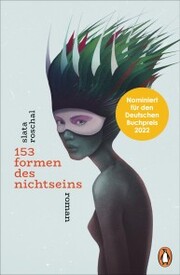Detailansicht
153 Formen des Nichtseins
eBook - Roman. Nominiert für den Deutschen Buchpreis 2022
ISBN/EAN: 9783641319939
Umbreit-Nr.: 1290941
Sprache:
Deutsch
Umfang: 176 S., 3.20 MB
Format in cm:
Einband:
Keine Angabe
Erschienen am 24.01.2024
Auflage: 1/2024
E-Book
Format: EPUB
DRM: Digitales Wasserzeichen
€ 14,99
(inklusive MwSt.)
Sofort Lieferbar
- Zusatztext
-
»Radikaler als Annie Ernaux« der Freitag
Ksenia ist Russin, sie ist Deutsche, sie ist Jüdin, sie ist unter Zeugen Jehovas aufgewachsen, sie ist eine junge Frau, Mutter, Schriftstellerin und Wissenschaftlerin, ist »dies, jenes und einiges in Querung« und gleichzeitig ist sie nichts davon. Bei der Erforschung des eigenen Identitätspluralismus sammelt Ksenia Ebay-Anzeigen, die das Wort »russisch« enthalten, notiert Gespräche von Arbeitskolleg:innen, beobachtet russische Mütter in der Stadt und israelische Verwandte auf Facebook, dolmetscht in einer Psychotherapie für Flüchtlinge, erinnert sich immer wieder an einen traumatischen kindlichen Zustand von Orientierungslosigkeit und Fremdbestimmung, betastet misstrauisch ihren Körper und fragt sich nach einer Definition und dem Wert des eigenen Daseins.Slata Roschals originelles, bissig-humorvolles Romandebüt, eine Collage von 153 Beobachtungen aus dem Alltag einer jungen Frau, wurde 2022 für den Deutschen Buchpreis nominiert, erhielt 2023 den Schubart-Literaturförderpreis der Stadt Aalen und den BücherFrauen-Literaturpreis »Christine«.
-
»Radikaler als Annie Ernaux« der Freitag
- Kurztext
- This book, the first feminist ethnography of the violence in Northern Ireland, is an analysis of a political conflict through the lens of gender. The case in point is the working-class Catholic resistance to British rule in Northern Ireland. During the 1970s women in Catholic/nationalist districts of Belfast organized themselves into street committees and led popular forms of resistance against the policies of the government of Northern Ireland and, after its demise, against those of the British. In the abundant literature on the conflict, however, the political tactics of nationalist women have passed virtually unnoticed. Begona Aretxaga argues here that these hitherto invisible practices were an integral part of the social dynamic of the conflict and had important implications for the broader organization of nationalist forms of resistance and gender relationships. Combining interpretative anthropology and poststructuralist feminist theory, Aretxaga contributes not only to anthropology and feminist studies but also to research on ethnic and social conflict by showing the gendered constitution of political violence. She goes further than asserting that violence affects men and women differently by arguing that the manners in which violence is gendered are not fixed but constantly shifting, depending on the contingencies of history, social class, and ethnic identity. Thus any attempt at subverting gender inequality is necessarily colored by other dimensions of political experience.
